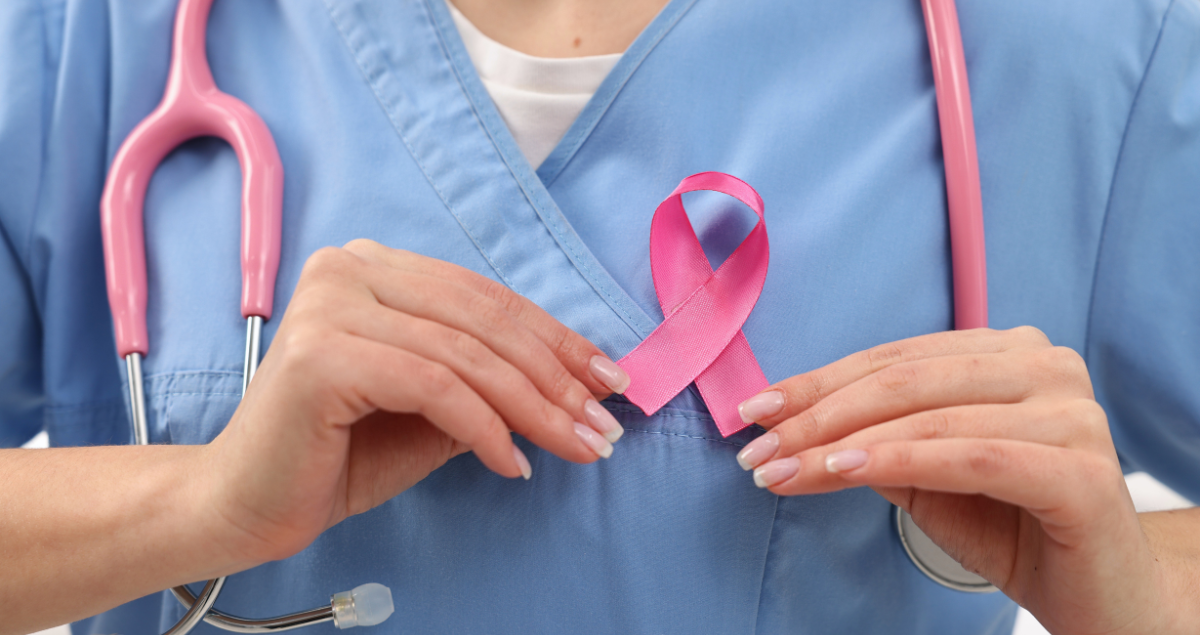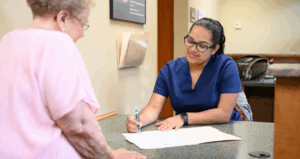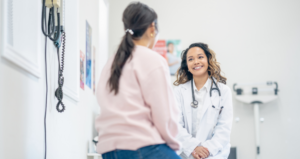Most people know or love someone who has been affected by breast cancer. Thankfully, breast cancer screenings can save lives by identifying the first signs while it is still manageable.
While getting a cancer screening can feel scary, especially when you don’t know what to expect, it is a valuable tool that allows you to take control of your health and make informed decisions. Here’s what you need to know about breast cancer screenings, also known as mammograms.
Why Get Preventative Screenings?
Preventative care is one of the most important things you can do for your health. Being active, getting enough sleep and eating a healthy diet can help you stay well – and preventative screenings, such as a mammogram, should be added to that list.
These health screenings can help establish a baseline for your health and alert you to any issues as early as possible. While nobody wants to receive an irregular test, the sooner an issue is detected, the more effectively it can be treated.
Risk Factors for Breast Cancer
Breast cancer is a type of cancer that develops in the breasts and is the second-most diagnosed cancer (second only to melanoma, also known as skin cancer). Who is most at risk of developing breast cancer? According to Mayo Clinic, the following are risk factors.
Risk Factors for Breast Cancer
| Being female | Obesity |
| Increasing age | Beginning your period at a younger age |
| A personal history of breast conditions | Beginning menopause at an older age |
| A personal history of breast cancer | Having your first child at an older age |
| A family history with breast cancer | Having never been pregnant |
| Inherited genes that increase cancer risk | Postmenopausal hormone therapy |
| Radiation exposure | Drinking alcohol |
If many of these risk factors apply to you, do not be alarmed. Breast cancer, as with other forms of cancer, is complex and caused by several factors interacting with each other. This includes your lifestyle, genetics and hormones. Some women with multiple risk factors never develop breast cancer, while others with virtually no risk factors still do. It’s important to discuss your risk factors and personal health history with your doctor.
Breast Cancer Screening Recommendations
To detect the signs of breast cancer as early as possible, the American Cancer Society recommends beginning breast cancer screenings at age 45. Some individuals with certain risk factors may be advised to begin at age 40. Discuss how often to get a mammogram with your doctor – this can vary depending on your personal risk factors.
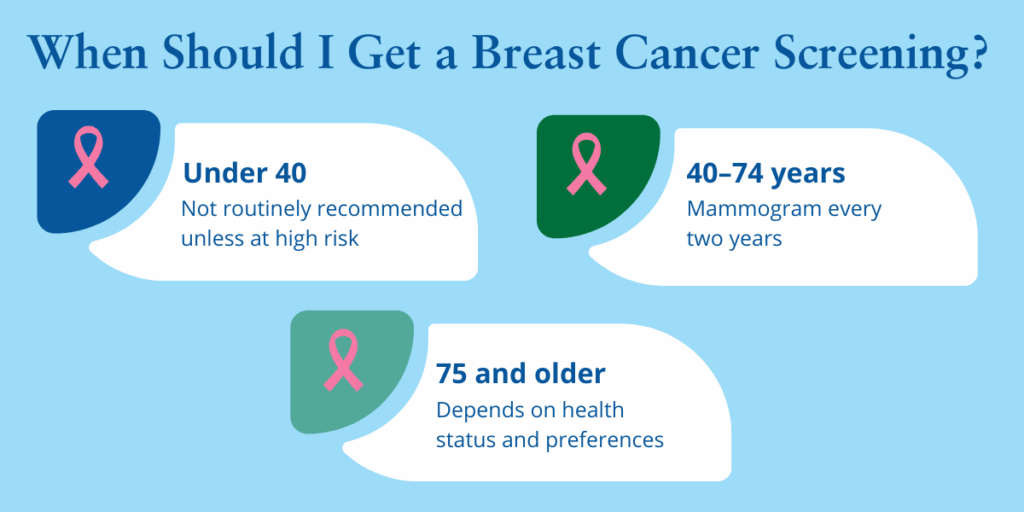
Most breast cancer screenings are available either at no cost or are covered by your insurance. If you’re unsure how to schedule a test, speak with your doctor or local health department for assistance. October is Breast Cancer Awareness Month, and many women use it as a reminder to schedule their annual or semi-annual screening.
You do not need to wait for symptoms to appear before getting screened. In fact, these tests are designed to identify the warning signs before any symptoms appear. And if you ever notice a lump or change in your breast, schedule an appointment with your doctor to have the change examined immediately.
What to Expect at a Breast Cancer Screening
Nervous about going to your mammogram appointment? While there will be some differences depending on your health care provider, here’s a basic overview of what you can expect from a breast cancer screening.
| 1. Check-In | Arrive at the clinic, provide ID and insurance information. |
| 2. Preparation | Staff may remind you to avoid deodorant, lotions or powders. |
| 3. Technologist Greeting | A certified mammography technologist explains the process and answers questions. |
| 4. Positioning | You stand in front of the mammogram machine; breast is gently compressed between two plates. |
| 5. Image Capture | X-ray images are taken from different angles; each compression lasts a few seconds. |
| 6. Completion | The technologist confirms images are clear; the screening usually takes about 20 minutes total. |
| 7. Follow-Up | Your doctor reviews the results and contacts you, usually within a few days. |
| Source: National Cancer Institute |
Taking Care of Your Health
It is normal—and common—to feel some anxiety about getting a cancer screening. You may feel that learning information about your health makes a potential health problem become “real.” However, do not let this anxiety stop you from taking proactive measures to protect your health. Screening may detect cancer early, potentially saving your life by ensuring you receive treatment before you detect symptoms.
In addition to keeping up with screenings, taking care of your overall health may help reduce your risk of breast cancer, according to the Mayo Clinic. This includes limiting alcohol intake, exercising regularly, maintaining a healthy weight and eating a healthy diet.
When it comes to getting a mammogram, it’s not just about checking a box. It can mean life-saving treatment through early detection for you or someone you love. Don’t wait—if you are due for one, schedule your breast cancer screening today.
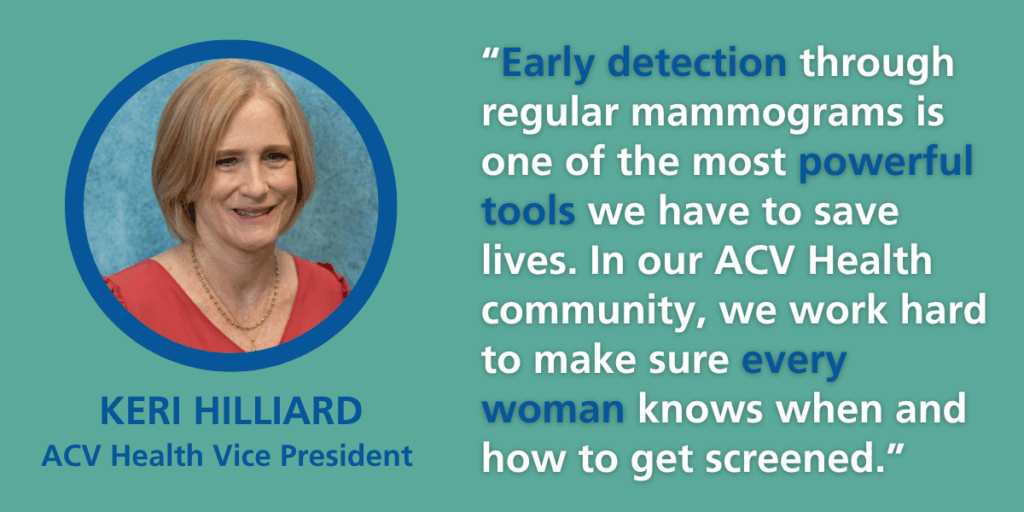
Find a Primary Care Provider
While going to the doctor for a breast cancer screening can feel intimidating at first, it’s important to build a relationship with a care provider you trust.
Our mission at ACV Health, an outreach of Advent Christian Village, is to provide compassionate care to those who need it in Live Oak, Florida. Patients experience the warmth of a small-town doctor’s office backed by the resources of a larger provider. Our services range from primary and specialty care to rehabilitation and home health.
Through our partner providers at the Copeland Medical Center, we also offer family dentistry, audiology, podiatry and more. Request an appointment today to get started.
DISCLAIMER: This blog is not intended as medical advice. If you have questions related to your health, please speak with health care professional.

